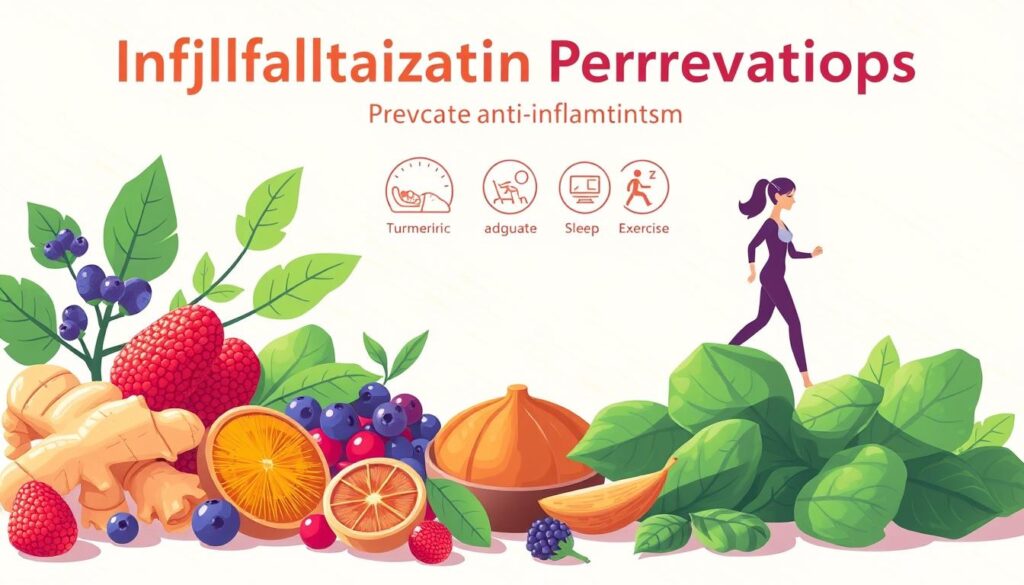Chronic inflammation affects over 133 million Americans, contributing to various health issues, from arthritis to cardiovascular disease. Simple changes in daily routines can significantly reduce inflammation, improving overall health.
Adopting inflammation prevention tips such as a balanced diet, regular exercise, and stress management can naturally mitigate inflammation. These natural anti-inflammatory practices not only enhance well-being but also reduce the risk of chronic diseases.
Key Takeaways
- Simple lifestyle changes can significantly reduce inflammation.
- A balanced diet is crucial in preventing inflammation.
- Regular exercise and stress management are key natural anti-inflammatory practices.
- Adopting these habits can improve overall health and well-being.
- Reducing chronic inflammation can lower the risk of various diseases.
Understanding Inflammation and Its Impact on Health
The human body’s inflammatory response is a double-edged sword, offering protection while also posing health risks. At its core, inflammation is a natural defense mechanism triggered by the immune system to combat infections and repair damaged tissues.

Acute vs. Chronic Inflammation
Acute inflammation is a short-term response to injury or infection, characterized by redness, swelling, and pain. It is a necessary process for healing. In contrast, chronic inflammation persists over time and can lead to various health issues. Lifestyle changes for inflammation control often focus on reducing chronic inflammation.
Common Signs Your Body Is Inflamed
Identifying inflammation can be straightforward if you know what signs to look for. Common indicators include:
- Persistent fatigue
- Joint pain or stiffness
- Skin issues like acne or rashes
- Digestive problems
Recognizing these signs early can prompt inflammatory response reduction methods, such as dietary changes or stress management.
The Connection Between Inflammation and Chronic Disease
Chronic inflammation is linked to various serious health conditions, including heart disease, diabetes, and certain cancers. By adopting inflammation prevention tips, such as a balanced diet and regular exercise, individuals can reduce their risk of developing these conditions.
Understanding the impact of inflammation on health is the first step towards making informed lifestyle changes for inflammation control. By addressing the root causes of chronic inflammation, individuals can improve their overall well-being and reduce the risk of chronic diseases.
Daily Habits to Prevent Inflammation Naturally
Adopting a few simple daily habits can significantly reduce inflammation and improve overall health. By incorporating natural anti-inflammatory practices into your daily routine, you can take a proactive approach to managing inflammation.
Anti-Inflammatory Nutrition Strategies
Diet plays a crucial role in inflammation management. Consuming foods rich in antioxidants and omega-3 fatty acids can help mitigate inflammatory responses.
Top 10 Anti-Inflammatory Foods to Include Daily
Incorporating the following foods into your diet can help fight inflammation:
- Fatty fish (salmon, sardines)
- Leafy greens (spinach, kale)
- Nuts and seeds (walnuts, chia seeds)
- Fruits (berries, oranges)
- Whole grains (quinoa, brown rice)
- Legumes (lentils, chickpeas)
- Herbs and spices (turmeric, ginger)
- Healthy oils (olive oil)
- Green tea
- Dark chocolate
| Food | Anti-Inflammatory Compound | Benefits |
|---|---|---|
| Fatty fish | Omega-3 fatty acids | Reduces inflammation, improves heart health |
| Turmeric | Curcumin | Potent anti-inflammatory, antioxidant properties |
| Green tea | Catechins | Antioxidant, anti-inflammatory effects |
Inflammatory Foods to Minimize or Eliminate
Reducing or eliminating the following foods can help minimize inflammation:
- Processed meats
- Refined sugars
- Dairy products (for some individuals)
- Gluten (for those with gluten intolerance)
- Processed foods
Hydration Practices for Reducing Inflammation
Adequate hydration is essential for reducing inflammation. Drinking plenty of water helps flush out toxins and maintain healthy cells.
It is recommended to drink at least 8-10 glasses of water per day. You can also consume hydrating foods like cucumbers and watermelon.
Meal Timing and Fasting Approaches
Meal timing and fasting have been shown to impact inflammation. Practices like intermittent fasting can help reduce oxidative stress and inflammation.
There are various fasting methods, including 16:8, 5:2, and alternate-day fasting. It’s essential to choose a method that fits your lifestyle and health goals.
By incorporating these inflammation-fighting habits into your daily routine, you can take a holistic approach to managing inflammation and improving your overall health.
Movement and Exercise Routines for Fighting Inflammation
Engaging in regular exercise is one of the most effective ways to reduce inflammation. Physical activity not only improves overall health but also plays a significant role in mitigating the effects of inflammation on the body.
Low-Impact Activities for Beginners
For those new to exercise or looking for low-impact activities, options such as brisk walking, cycling, and swimming are excellent starting points. These activities are gentle on the joints while still providing the benefits of physical activity.
- Brisk walking: Improves cardiovascular health and boosts mood.
- Cycling: Enhances leg strength and cardiovascular fitness.
- Swimming: Provides a full-body workout with minimal joint stress.
Strength Training to Combat Inflammatory Processes
Incorporating strength training into your routine can further help combat inflammation. Building muscle through resistance exercises not only improves body composition but also enhances metabolic health.
Examples of strength training exercises include:
- Weightlifting
- Bodyweight exercises like push-ups and squats
- Resistance band exercises
Finding Your Optimal Exercise Balance
It’s crucial to find a balance that works for you. Overexertion can lead to injury, while too little exercise may not effectively combat inflammation. Listening to your body and adjusting your routine accordingly is key.
Simple Movement Breaks to Incorporate Throughout Your Day
In addition to structured exercise, incorporating simple movement breaks throughout the day can be beneficial. Activities such as stretching, taking the stairs, or short walks can help reduce sedentary behavior and its associated inflammatory effects.
- Take a short walk during your lunch break.
- Stretch at your desk to improve circulation.
- Opt for stairs over elevators when possible.
By combining regular exercise with simple movement breaks, you can effectively reduce inflammation and improve your overall health.
Lifestyle Adjustments for Inflammation Control
Lifestyle plays a crucial role in inflammation control, and making the right adjustments can be highly beneficial. By incorporating specific daily habits and broader lifestyle changes, individuals can effectively manage and reduce inflammation.
Sleep Optimization Techniques
Quality sleep is essential for overall health and plays a significant role in inflammation control. Poor sleep can lead to increased inflammation, while adequate rest can help regulate the body’s inflammatory response.
Creating an Inflammation-Reducing Sleep Environment
To optimize sleep, it’s crucial to create a conducive sleep environment. This includes maintaining a cool room temperature, reducing noise, and using blackout curtains to ensure darkness. Investing in a comfortable mattress and pillows can also significantly improve sleep quality.
Pre-Sleep Rituals That Combat Inflammation
Engaging in pre-sleep rituals such as meditation, reading, or a warm bath can help signal the body that it’s time to sleep. Avoiding screens and electronic devices before bedtime is also recommended, as the blue light they emit can interfere with the body’s natural sleep-wake cycle.
Stress Management Practices
Chronic stress can exacerbate inflammation, making stress management a critical component of inflammation control. Techniques such as mindfulness meditation, deep breathing exercises, and yoga can help reduce stress levels. Regular physical activity and spending time in nature are also effective stress-reducing strategies.
Environmental Toxin Reduction Strategies
Reducing exposure to environmental toxins is another important aspect of managing inflammation. This can be achieved by using non-toxic household cleaning products, avoiding plastics that contain BPA, and choosing personal care products that are free from harmful chemicals. Additionally, filtering drinking water and reducing exposure to pollution can help minimize toxin intake.
By implementing these lifestyle adjustments, individuals can take a proactive approach to managing inflammation and improving their overall health.
Conclusion: Building Your Sustainable Anti-Inflammatory Routine
Developing a daily routine that incorporates inflammation prevention tips can significantly impact overall health. By adopting natural anti-inflammatory practices, individuals can reduce their risk of chronic diseases and improve their quality of life.
A daily routine for inflammation prevention involves a combination of healthy habits, including a balanced diet, regular exercise, and stress management. By starting with small, manageable changes, individuals can gradually work towards a healthier lifestyle.
Incorporating anti-inflammatory foods, such as omega-3 rich fish and turmeric, into one’s diet can help reduce inflammation. Additionally, practices like meditation and yoga can help manage stress, a key contributor to inflammation.
By making these natural anti-inflammatory practices a part of daily life, individuals can take control of their health and reduce their risk of chronic diseases. With persistence and patience, a sustainable anti-inflammatory routine can become a lasting part of one’s lifestyle.
